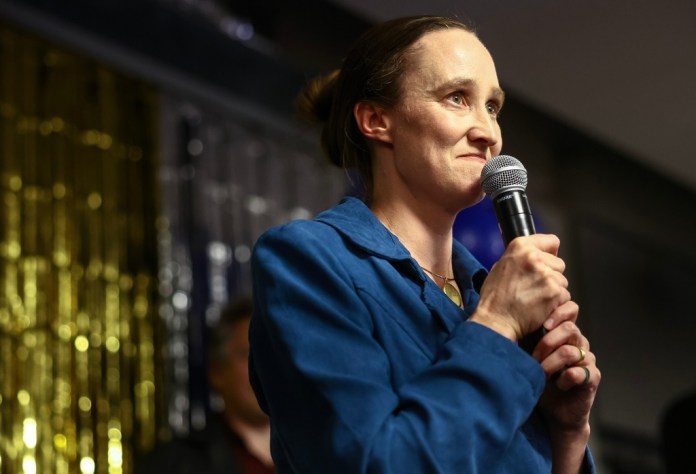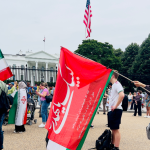Self-proclaimed socialist Katie Wilson won the race for Seattle mayor in a stunning upset this week without earning the endorsement of America’s de facto socialist party, the same political force credited with aiding New York Mayor-elect Zohran Mamdani’s decisive victory.
Against the odds, Wilson narrowly beat Democratic incumbent Bruce Harrell by a margin of fewer than 2,000 votes, following a final count of mail-in ballots on Wednesday. On the campaign trail, Wilson thought of replicating Mamdani’s campaign strategy to squeeze out a win.
Months out from the election, Wilson began courting the Democratic Socialists of America behind the scenes after witnessing Mamdani win his Democratic primary in June, a “Mamdani moment” she had hoped to capture for herself by gaining the DSA’s mobilization power, or “ground game,” as she put it.
Yet the socialist wing of the political Left ruled: Mamdani was in, Wilson was out.
“She sought the endorsement of the Seattle chapter of the Democratic Socialists of America (SDSA), but they declined,” Wilson’s campaign manager Alex Gallo-Brown told the Washington Examiner. “I’m not sure why.”
Gallo-Brown noted that Wilson received a near-unanimous endorsement from the Young Democratic Socialists of America’s University of Washington chapter, which is the DSA’s student-led section located in Seattle. College students aside, Wilson lacked the DSA’s formal support.
On paper, Wilson sounded like a shoo-in. Similar to Mamdani, Wilson floated the idea of implementing “public option” grocery stores. Over the years, Wilson has worked a wide range of working-class jobs, including those of a barista, laborer, apartment manager, and boatyard worker. As the co-founder of the Transit Riders Union, she primarily uses public transit to get around Seattle. Above all, Wilson aims to usher “the idea of socialism further into the mainstream of political life.”
SEATTLE SOCIALIST RIDES MAMDANI WAVE TO WIN MAYORAL ELECTION AS CITY SEES LARGE PROGRESSIVE SHIFT
So what was the hold-up? For one, she is short of DSA status. Although she identifies as a democratic socialist, Wilson is not an official member of the DSA.
“Katie Wilson is not now, nor has she ever been, a member of the Democratic Socialists of America,” DSA’s Seattle chapter told the Washington Examiner.
The Seattle DSA, whose South King County branch backed a separate Seattle-area candidate this election cycle, indeed did not endorse Wilson. Nor did the national DSA, which only does so if a candidate has already earned the endorsement of at least one local DSA chapter.
So Wilson underwent an elaborate vetting process to decide whether she was worthy of the Seattle DSA’s stamp of approval.
On Oct. 16, the Seattle DSA held a memberwide Q&A session with Wilson for the then-mayoral candidate to make her case on why she should receive the chapter’s endorsement, ahead of a membership vote at the October general meeting on whether to endorse Wilson.
Wilson additionally answered questions before the chapter’s Electoral Working Group steering committee concerning her endorsement eligibility.
According to a transcript of its Sept. 16 meeting, some committee members expressed skepticism about Wilson’s commitment to the socialist cause, noting that she only started identifying as a socialist in the past year or two, at least openly, while making clear to the public her political differences with the DSA.
“I am curious what it means to you when you say that you’re a socialist, what metrics you use to claim that label, and how does that translate in the policies that you’ll push for in office?” Seattle DSA secretary Alexander Mayben asked.
Wilson said she has been a socialist since she moved to Seattle more than 20 years ago, but she added that she strategically refrains from using the label to avoid scaring off more moderate-minded voters.
“It’s true that I don’t emblazon that on my forehead,” Wilson said. “Part of the reason for that is what my socialism tells me. What I should be doing is figuring out how to organize ordinary, nonideological people around the bread-and-butter issues that affect their lives.”
“It’s not that I want to keep it a secret,” she clarified in response to a follow-up question on her socialist identity, adding, “I’m not, at this point, planning to write ‘socialist’ on my website in big letters.”
As part of the candidate screening protocols, Wilson also completed the Seattle DSA’s endorsement questionnaire, where she offered similarly tepid responses to pointed questions about her allegiance.

Asked if she would identify herself as a democratic socialist in campaign literature, Wilson said she would include the Seattle DSA’s logo on her website’s list of endorsements. Prompted to declare whether she would “promote and fight for the demands of the DSA national platform,” Wilson said there is “significant overlap” between their objectives.
However, they differed on several key issues. Defunding the police, for instance, was not part of Wilson’s campaign platform.
“I don’t think that defunding police budgets has proved to be a helpful frame in thinking about how to reduce harmful overpolicing or improve true community safety,” Wilson wrote on the questionnaire.
She supports rent control, but it “depends” on the details of the proposal, as these policies “can be designed well or poorly.” Wilson was not unequivocally in favor of ending the city’s sweeps of homeless encampments either.
“There are also going to be instances where we are probably going to have to require people to move,” Wilson said, citing homeless people camping outside the entrance to a light rail station. “I think that’s just a kind of a reality, both a practical reality and a political reality.”
After all the cross-examination, what was the chapter’s final ruling on Wilson?
The Seattle DSA told the Washington Examiner that Wilson did not commit to all of the group’s candidacy requirements — the dealbreaker being that she was unwilling to share her campaign data with the chapter or endorse every candidate that the Seattle DSA endorses.
The national DSA, which is organized as a 501(c)(4) nonprofit group, is not a designated political party with a ballot line. Still, the chapter said, the Seattle DSA aspires to operate like a political party.
“Political parties share data between campaigns,” the Seattle DSA said. “They expect their candidates to endorse other candidates within that political party. Katie Wilson articulated clearly, in the process of seeking Seattle DSA’s endorsement, that she did not commit to these things.”
On the candidate questionnaire form, Wilson indicated she was reluctant to turn over electoral, field, and volunteer data, including emails, phone numbers, and donor lists, among other records, as requested.
“I don’t think the people who have entrusted their information to my campaign would be very happy if we handed it over to Seattle DSA without their consent,” Wilson wrote.
When pressed at the September committee meeting on why she was so adamant about not sharing data, Wilson was more direct.
“I definitely don’t want to just hand over all my campaign data,” Wilson told the elections committee. “Again, I just don’t think that the people who’ve signed up for the campaign would like me handing it over to another organization. It’s just not what they signed up for.”
Many other DSA chapters practice data sharing as a tactic toward transforming the DSA into a party-like operation, or a “proto-party,” by expanding its recruitment infrastructure and, in turn, its organizing base.
During the discussion with Wilson, it was mentioned that she wanted a place to “funnel” campaign volunteers after the election. The Seattle DSA, of course, hoped the chapter could collect its manpower. Wilson softened slightly on that front, acknowledging that she, as a longtime community organizer and “coalition builder,” knows what it takes to scale up a movement.
To that end, committee co-Chairman Chanpreet Singh said endorsees are expected to cross-endorse other DSA candidates. Doing so, according to the DSA alliance-building framework, essentially forms a socialist bloc, allowing the organization to enter elections as a single, unified slate.
Under this pact, Wilson would be expected to back the chapter’s candidate of choice in the 2027 city council elections.
DEMOCRATIC SOCIALISTS QUIETLY CAPTURE CITY COUNCILS ACROSS AMERICA
“As mayor, you’ll also need support on the council if you win,” Singh told Wilson. “We will want to run someone for council in 2027.”
Wilson was not swayed.
“No, I don’t think I can commit to that,” she countered. “It’s likely that I would want to endorse the same person [as the DSA’s pick], but I don’t think I can outsource my decision-making on endorsing other candidates.”
DSA endorsements typically have strings attached. If elected, endorsed candidates are expected to reciprocate by supporting the DSA’s selection of political hopefuls once in office. Another “expectation” is that newly elected endorsees will meet each month with the DSA’s chapter-specific Socialists in Office committees to discuss legislative priorities.
“This is a pretty big commitment that Zohran has committed to,” Wilson was told, after saying she could not promise a standing appointment with the DSA at this time.
She said her office would determine “cadences of communication with many organizations we want to have working relationships with, including Seattle DSA,” but in terms of one-on-one confabs, “I cannot commit to monthly meetings with me personally.”
In neighboring Oregon, the four DSA members seated on the 12-person Portland City Council regularly meet with the chapter’s Socialist in Office committee, an arrangement that no other external organization has at City Hall.
Through these committees, which are designed to keep their respective officeholders in check, the DSA wields significant influence over the officials it has helped elect.
Councilman Mitch Green, one-fourth of the socialist quartet comprising Portland’s chief policymaking body, told Willamette Week that while the DSA does not issue “marching orders,” he will get an earful if he acts “way out of line with the values of the organization.”
SOCIALIST CANDIDATES CRUISED TO VICTORY IN OVER A DOZEN RACES
“We want to put someone in office who is going to bring DSA with them to office,” Olivia Katbi, co-chairwoman of the Portland DSA, told Willamette Week. “Our councilors are DSA. So what they are doing is DSA, until further notice, unless we say it’s not.”
Across the country, democratic socialists occupying positions at all levels of government abide by similar obligations to carry out the DSA’s agenda. Mamdani, as a New York state assemblyman, met with DSA leadership as frequently as once a week to review pending bills and decide which ones to support.























